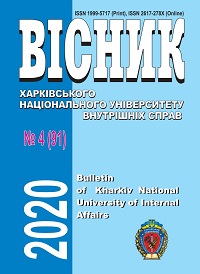Investigation of Procedural Decisions at the Beginning of Pre-Trial Investigation
DOI:
https://doi.org/10.32631/v.2020.4.25Keywords:
an investigator, procedural decision, initiation of pre-trial investigation, resolution.Abstract
The author of the article studies one of the most important current topics from the point of view of practice – the decision of investigators to initiate a pre-trial investigation in criminal proceedings. It is emphasized that all further movement of criminal proceedings depends on the timeliness of the investigator’s decision to conduct a pre-trial investigation. Moreover, it is of great importance for the effective achievement of such a task of criminal proceedings as the speed and completeness of the investigation. It is determined that the guarantee of non-entry of information about a criminal offense in the Unified Register of Pre-trial Investigations is the right of the applicant to appeal against decisions, actions or omission of the investigator, prosecutor. At the same time, the absence of a legal requirement to make a procedural decision to initiate or to refuse a pre-trial investigation, in particular in the form of a ruling, does not always contribute to the exercise of the applicant’s right to appeal. It is confirmed by the relevant court decisions, which, unfortunately, currently takes place in practice. Based on the results of the study, possible ways to improve the current criminal procedural legislation of Ukraine on this issue are proposed.
The author has determined that the adoption of a procedural decision is impossible without a mandatory component of such a mechanism as the subject endowed with the relevant powers, and the quality of the decision itself directly depends on professional competence. The investigator, being authorized to conduct criminal proceedings, is an official who exercises state power through the adoption of procedural decisions, which affects the further direction of criminal proceedings.
It is emphasized that the content of the procedural decision of the investigator, in a broad sense, is a product of mental activity, which forms the basis for the tasks of criminal proceedings.
It is concluded that the investigator’s decision in the form of a reasoned decision to initiate or to refuse a pre-trial investigation is quite logical. It is explained by the fact that, first of all, the decision is an official written response to the appeal. It is established that early receipt of the decision is a guarantee of the right to appeal against decisions, actions or omission of the pre-trial investigation agencies.
Downloads
References
Aleksiichuk M.M., 2007. Problems of improvement of activity of investigative divisions of city districts of internal affairs [Problemy vdoskonalennia diialnosti slidchykh pidrozdiliv miskraioniv vnutrishnikh sprav]. Naukovyy visnyk KNUVS – Science Bulletin of Kiev National University of Internal Affairs, Iss. 5, pp. 223-228.
Komissarchuk Yu.A. and Riashko O.V., 2013. Adoption of procedural decisions as a means of positive implementation of the principle of presumption of innocence and ensuring proof of guilt [Pryiniattia protsesualnykh rishen yak zasib pozytyvnoi realizatsii zasady prezumptsii nevynuvatosti ta zabezpechennia dovedenosti vyny]. Naukovì zapiski Lʹvìvsʹkogo unìversitetu bìznesu ta prava – Scientific notes of Lviv University of Business and Law, Iss. 10, pp. 248-251.
Kucheriava O.Yu. and Levendarenko O.O., 2013. Procedural independence of the investigator [Protsesualna samostiinist slidchoho]. Vìsnik studentsʹkogo naukovogo tovaristva Donecʹkogo nacìonalʹnogo unìversitetu ìmenì Vasilâ Stusa, Vol. 1, No. 5, pp. 66-69.
Bernaz V.D., 2005. Investigator's decision (forensic, procedural and psychological aspects) [Rishennia slidchoho (kryminalistychnyi, protsesualnyi ta psykholohichnyi aspekty)]. Odesa.
Marochkin O.I., 2010. Regarding the system of procedural decisions of the investigator [Shchodo systemy protsesualnykh rishen slidchoho]. Problemy zakonnosti – Problems of Legality, Iss. 110, pp. 255-263.
Havryliuk L.V., 2018. Legal status of investigators: some aspects [Pravovyi status slidchykh: deiaki aspekty]. Nauka ì pravoohorona, No. 2, pp. 234-239.
Lupinskaya P.A., 1976. Decisions in criminal proceedings. Their types, content and forms [Resheniya v ugolovnom sudoproizvodstve. Ikh vidy, soderzhanie i formy]. Moscow: Yuridicheskaya literatura.
Hlynska N.V., 2003. Substantiation of decisions in criminal proceedings [Obgruntuvannia rishen u kryminalnomu protsesi]. Ph.D. dissertation. Yaroslav Mudryi National Law Academy of Ukraine.
Lomidze A.B., 2001. Prosecutor's supervision over the legality and validity of procedural decisions taken by the investigator [Prokurorskii nadzor za zakonnost’yu i obosnovannost’yu prinimaemykh sledovatelem protsessual’nykh reshenii]. Moscow: Yurlitinform.
Marochkin O.I., 2015. Motivation of procedural decisions of the investigator [Motyvuvannia protsesualnykh rishen slidchoho]. Kyiv: Natsionalna akademiia prokuratury Ukrainy.
Vlasov A.A., 1979. The powers of an investigator in Soviet criminal proceedings [Polnomochiya sledovatelya v sovetskom ugolovnom protsesse]. Abstract of Ph.D. dissertation. All-Union Correspondence Law Institute.
Melnychenko A.V., 2017. Current issues of entering information into the Unified Register of pre-trial investigations and appeals against procedural decisions [Aktualni pytannia vnesennia vidomostei do Yedynoho reiestru dosudovykh rozsliduvan ta oskarzhennia protsesualnykh rishen]. Naukovij vìsnik publìčnogo ta privatnogo prava – Scientific Journal of Public and Private Law, Iss. 5, Vol. 1, pp. 205-209.
Melnychenko A.V., 2018. Ensuring the rights of the person in the pre-trial investigation [Zabezpechennia prav osoby na dosudovomu rozsliduvanni]. Ph.D. dissertation.



